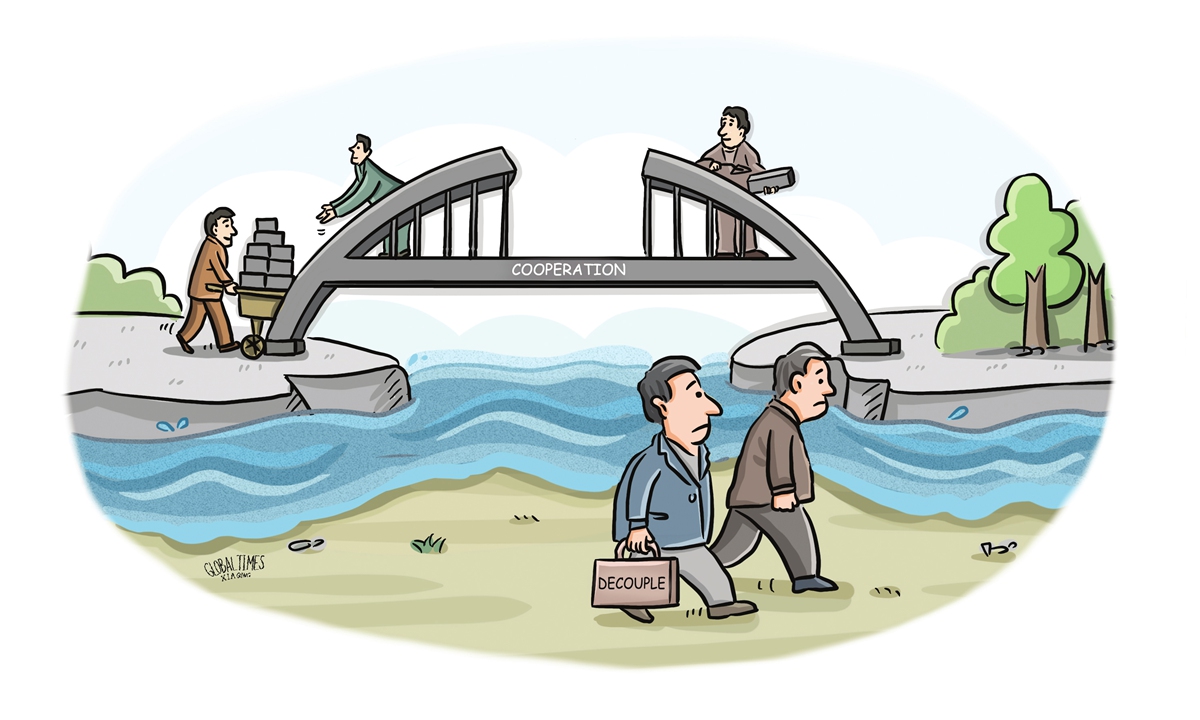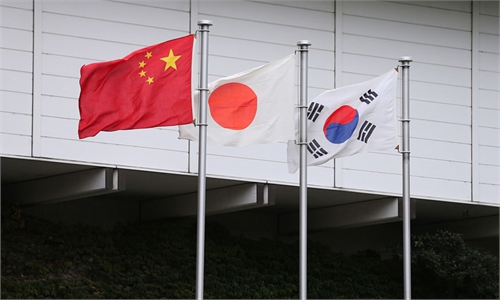
Illustration: Xia Qing/ GT
From December 1, China officially began implementing a unilateral visa-free policy for citizens holding ordinary passports from Malaysia, France, Germany, Italy, the Netherlands, and Spain. This is a facet of China's active promotion of high-level opening-up to the outside world and its efforts to promote high-quality development. It also signifies that China is becoming more confident and open. However, neighboring countries Japan and South Korea are not on the list. In fact, China unilaterally granted 15-day visa-free entry to Japanese citizens holding ordinary passports 20 years ago, but it was interrupted after the outbreak of the COVID-19 pandemic. Part of the reason is that both Japan and South Korea had adopted discriminatory entry policies against Chinese citizens during the later stages of the pandemic, severely impeding personnel exchanges between the countries. Therefore, in the future, China, Japan, and South Korea need to explore a path to gradually expand and deepen trilateral cooperation, starting with expanding people-to-people exchanges.The trilateral foreign ministers' meeting between China, Japan and South Korea, which ended on November 26, reached a consensus on substantial cooperation in the fields of economy, trade, science, technology and digital transformation, people-to-people exchanges, environmental protection and aging. The foreign ministers of the three countries have pointed out the direction for strengthening future cooperation, and the key now lies in implementation. Among the six major areas of cooperation between China, Japan, and South Korea, the three countries should also start by enhancing people-to-people exchanges. As barriers to personnel exchanges are gradually removed, personnel exchanges will naturally become more frequent, which will inevitably enhance mutual understanding and common interests, leading to an increase in commercial activities and investment demand, further deepening mutual trust between governments and driving cooperation in various fields among the three countries.
The obstacles to personnel exchanges are just a microcosm of the existing contradictions among the three countries. The reason is that although China has a huge market, the governments of Japan and South Korea do not see China's development as an opportunity but rather a threat and challenge. Behind this, there are intentional pressures from third parties. Some countries have imposed various restrictions on cooperation in nontraditional security areas under the guise of national security, even affecting personnel exchanges, education and healthcare. Japan and South Korea have blindly followed these certain countries in decoupling from China, creating political and ideological opposition and shaping emotional opposition among their citizens.
China, Japan, and South Korea each have their own strengths and weaknesses. However, there is strong economic complementarity among the three countries. Once they join hands and achieve a high degree of integration, they will generate tremendous attraction. The combined GDP of China, Japan, and South Korea already accounts for more than 60 percent of Asia's GDP. The total population of the three countries is about 1.6 billion, and they are geographically close, with similar traditional cultures and a natural sense of closeness between people. This is a significant advantage that is difficult to match in any other region. This means that China, Japan, and South Korea can not only become the leaders of East Asian cooperation but also the leaders of Asia-Pacific and even global cooperation. Especially against the backdrop of a global economic downturn, regional instability and the prevalence of populism, it is even more incumbent upon China, Japan and South Korea to join hands and promote cooperation, thereby driving East Asian, Asia-Pacific, and global cooperation.
Although there is vast space for cooperation and a wide range of areas for collaboration among China, Japan and South Korea, there is still a lack of motivation, which in turn leads to shallow cooperation. The lack of progress in China-Japan-South Korea free trade agreement negotiations is an example. Japan touts itself as a Western country, and now South Korea is following suit. This makes both countries increasingly show reluctance toward East Asian cooperation. The three East Asian countries are neighbors that cannot be moved. If the three countries share the same aspirations and work together, they can certainly create a new miracle in East Asia, forge a new path for East Asia, and establish new East Asian values. This is not only a contribution to East Asia but also a contribution to all of humanity.
The author is the director and professor of the Center for Korean Peninsula Studies at the Shanghai University of International Business and Economics. opinion@globaltimes.com.cn

